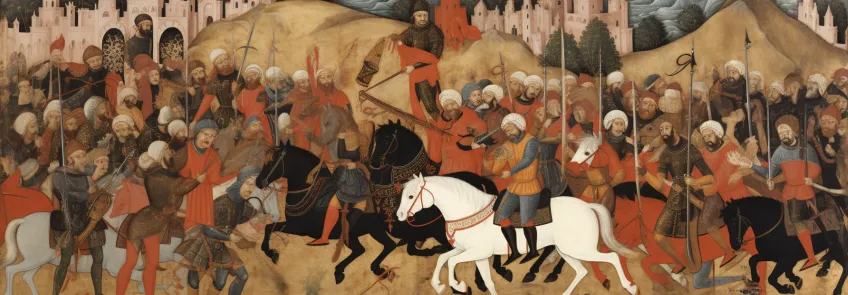Khazar Culture

Commands
The following command will set your culture to 'Khazar.'
The following command will change the culture of the specified county to 'Khazar.'
Information
| Name | Khazar |
| Culture ID | khazar |
| Heritage | Turkic |
| Ethos | Egalitarian |
| Language | Oghur |
| Architecture | Eurasian Steppe |
| Fashion | Mongolian |
| Coat of Arms | Turkic |
| Military Equipment | Mongolian |
Overview
The Khazars were a semi-nomadic Turkic people who, at their height, established and ruled Khazaria, a significant state in Eastern Europe from around the 7th century until the 10th century. Khazar culture was incredibly diverse, with influences from several different civilizations due to its strategic location on the Silk Road. It was a hub for a wide variety of ethnic groups including Turks, Slavs, Greeks, and Scandinavians.
As a society, the Khazars were quite progressive. They adopted a system of religious tolerance unusual for the period, with synagogues, churches, mosques, and pagan temples co-existing peacefully. The Khazar government was led by a Khagan, often hereditary, and a Bek who was responsible for military, civil, and judicial decisions.
Interestingly, many Khazars converted to Judaism in the 8th and 9th centuries, an exceptional occurrence as few historical groups have chosen to convert to Judaism en masse. This conversion is a topic of much research and debate among scholars.
The Khazar Empire declined after a series of invasions in the 10th century by the Rus', leading to the eventual dissolution of the Khazar state. Today, the legacy of the Khazars lives on in historical and archaeological studies. Their society serves as a compelling example of early multi-cultural and multi-religious existence.
Egalitarian Ethos

Egalitarian Ethos
Intolerance and isolationism may be the way for others, but this culture recognizes that accepting difference is far better than annihilating it.
- +35% Cultural Acceptance Gain
- +10 Vassal Limit
- +5 Different Culture Opinion
- +5 Different Faith Opinion
- +10 Minority Vassal Opinion
Each culture will have an ethos, which represents the core values, principles and attitude towards life that the culture has. It also determines which court types are available for kingdoms and empires.
Khazar Traditions
- Horse Lords
- Stand and Fight!
- Steppe Tolerance
Each culture will have several traditions, which represent the main customs of a culture and can grant various effects. A culture can have up to five traditions in the tribal era, with every additional era reached granting an additional slot for Traditions.
Khazar Architecture
Eurasian Steppe

Turkic Cultures
The following are the IDs of cultures that share the same heritage, Turkic, as the Khazar culture:
| Culture | Culture ID | Ethos |
|---|---|---|
| Avar | avar | Bellicose |
| Bashkir | bashkir | Stoic |
| Bolghar | bolghar | Communal |
| Cuman | cuman | Bellicose |
| Karluk | karluk | Communal |
| Khazar | khazar | Egalitarian |
| Kimek | kimek | Stoic |
| Kipchak | kipchak | Stoic |
| Kirghiz | kirghiz | Egalitarian |
| Laktan | laktan | Stoic |
| Pecheneg | pecheneg | Bellicose |
| Shatuo | shatuo | Bellicose |
| Uriankhai | uriankhai | Communal |
| Uyghur | uyghur | Spiritual |
| Yughur | yughur | Communal |